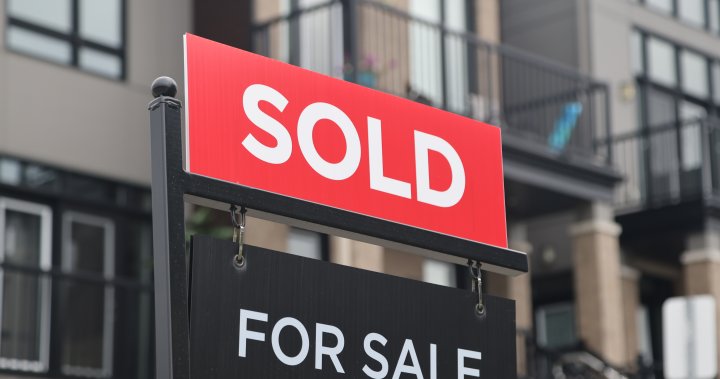If you’re looking to buy a house this summer or renew your mortgage, there could be good news for you. But whether your rates are going up or down depends on where you live.
The monthly home affordability report by RateHub.ca looked at home prices and mortgage rates from 13 Canadian cities. In seven of those cities, mortgage affordability improved.
While borrowing costs remained largely stagnant in late March and early April, plummeting home sales across Canada contributed to improved affordability, the report said on Thursday.
According to the Canadian Real Estate Association, home sales dropped by 9.8 per cent in April.
“The lowest 5-year fixed rate as of May 22 is 3.84%. We’ve used the average of the Big Five Bank’s rates in our calculations. Securing a lower rate, such as 3.84%, would have a big impact on how much you can qualify for,” Penelope Graham, mortgage expert at RateHub.ca, said in a news release.
According to the report, the city that saw the most significant improvement in housing affordability in April was Hamilton, Ont.
The average home price in Hamilton was $801,400 — a drop of $9,600 from March.
A Hamilton homebuyer would need an annual income of $166,500 to be able to buy a house. With a 10 per cent down payment and a 25-year amortization, their monthly mortgage rate came down to $4,066 a month.
This means that a Hamilton mortgage buyer who locked down their rate in April would save $49 a month compared to someone who locked it down in March.
Get daily National news
Get the day’s top news, political, economic, and current affairs headlines, delivered to your inbox once a day.
“The Hamilton borrower in this scenario would save $49 on their monthly mortgage payment ($588 a year) in April compared to if they bought in March,” Graham said.
The mortgage figures in this report are based on a mortgage with a 10 per cent down payment, 25-year amortization, $4,000 annual property taxes and $150 monthly heating costs.
Toronto saw the second biggest drop in home prices, with the average home price dropping $7,500 to $1,009,400. A Torontonian would need an annual income of $205,850 to afford a home and their average mortgage payments came in at $5,122 a month — a drop of $38.
While Vancouver saw the third biggest decline in home prices, with a decline of $6,300, it remains Canada’s most expensive housing market by far, with an average home in April costing $1,184,600.
Vancouverites also need the highest annual income of any city in Canada at $238,970 a year. They would also have to pay the highest monthly mortgage of $6,011 with a 10 per cent down payment, although it dropped $32 from March.
The two Maritime markets that saw a drop in home prices are Fredericton (average home price of $333,900) and St. John’s ($369,400). The annual income needed to buy a home is $78,000 in Fredericton and $84,760 in St. John’s.
The average monthly mortgage payment for a homebuyer in Fredericton in April was $1,693 (a drop of $11 a month) and in St. John’s it was $1,100 (a drop of $6 a month).
The two big Alberta markets saw affordability improve marginally.
The average Calgary home cost $583,000 in April, a drop of just $400. A homebuyer in that city would need an annual income of $125,170. The average Edmonton home cost $431,100 in April, a drop of just $200, and an Edmontonian would need an annual income of $96,430.
Monthly mortgage payments came down by $2 in Calgary ($2,958) and $1 in Edmonton ($2,187).
In six out of 13 cities, mortgage rates and home prices have both gone up.
The city that saw affordability worsen the most was Regina. The average home price in Regina rose $9,100 to $335,400 and the annual income needed to buy a house rose to $78,330.
A Regina homebuyer who locked down their mortgage in April would have to pay $1,702 a month.
“The Regina borrower in this scenario would pay an additional $46 on their monthly mortgage payment ($552 per year),” Graham said.
Montreal saw the second steepest hike in housing affordability with the average home price rising $6,300 to $574,900 in April compared to the price in March.
A Montrealer who locked down their mortgage in April would have to pay an additional $32 a month with monthly costs of $2,917 compared to one who did so the month prior. They would need an annual income of $123,640.
In April, Victoria came in as the third most expensive housing market in Canada after Vancouver and Toronto, with average home prices rising to $897,300 and the average homebuyer needing an annual salary of $184,620. Monthly mortgage costs rose $32 to $2,917 a month.
The cost of the average home in Halifax rose by $6,000 to $563,000, with an annual income of $121,400 needed to buy a house. Monthly mortgage payments rose to $2,857.
Housing also got more expensive in the nation’s capital, with the average Ottawa home now costing $631,200. A homebuyer in that city would need an annual income of $134,300. An Ottawa resident locking down their mortgage in April with a 10 per cent down payment would have to pay $3,203 a month.
Winnipeg also saw a marginal worsening of affordability, with home prices rising by $700 to $385,300 and monthly mortgage costs rising by $4 to $1,955. A Winnipeg resident would need an annual income of $87,770 to buy a house, the report said.

